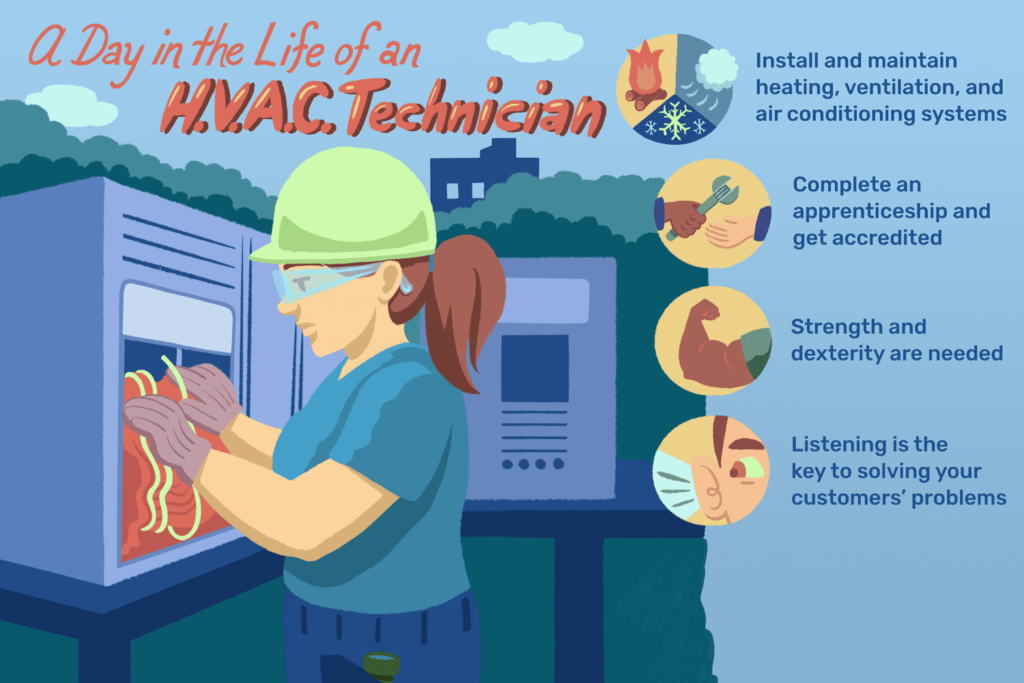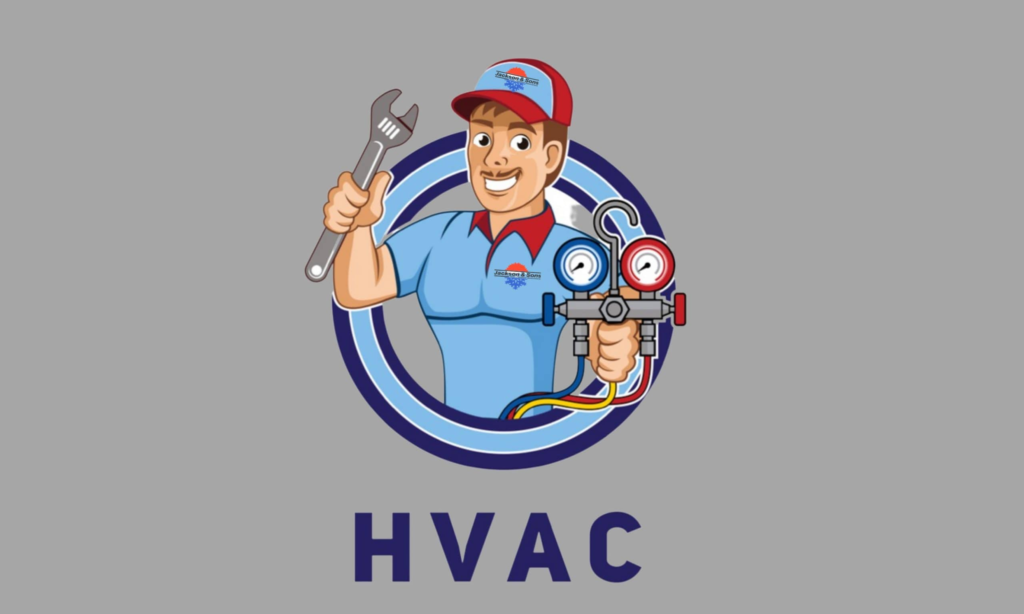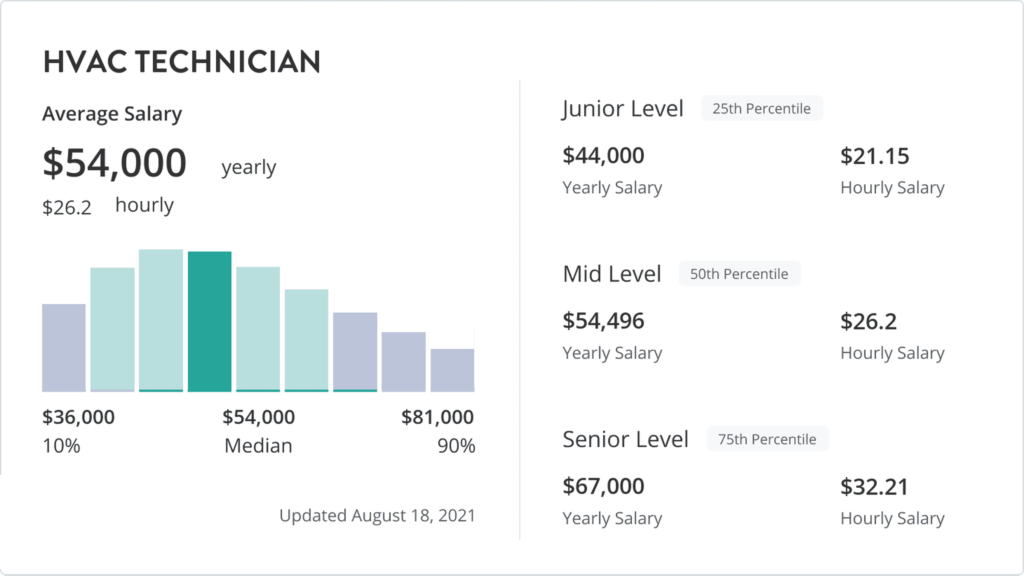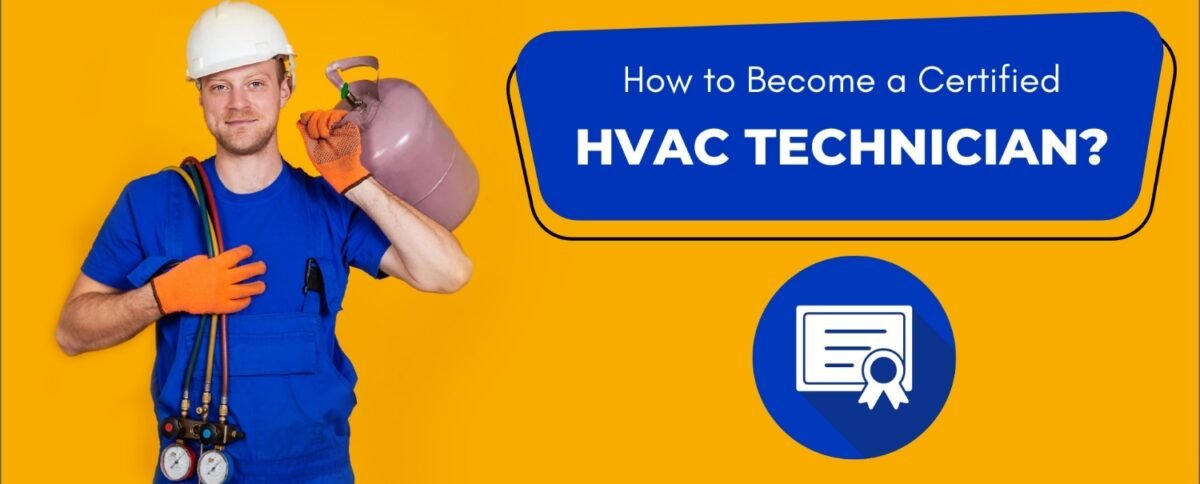What is an HVAC Technician?
An HVAC technician, also known as a heating, ventilation, and air conditioning technician, is a skilled professional responsible for installing, maintaining, and repairing heating, cooling, and ventilation systems in residential, commercial, and industrial settings. HVAC technicians play a crucial role in ensuring that buildings have comfortable and healthy indoor environments by regulating temperature, humidity, and air quality.
The primary responsibilities of an HVAC technician may include:

- Installation: HVAC technicians install heating, cooling, and ventilation systems in new construction projects or existing buildings. They work with various components such as furnaces, air conditioners, heat pumps, ductwork, thermostats, and controls, ensuring that the systems are properly connected, calibrated, and functioning efficiently.
- Maintenance: HVAC systems require regular maintenance to operate effectively and efficiently. HVAC technicians perform routine inspections, clean components, lubricate moving parts, replace filters, and check system performance. By conducting preventive maintenance, they help identify potential issues and ensure that systems are operating at optimal levels.
- Repair: When HVAC systems experience malfunctions or breakdowns, HVAC technicians diagnose the problems and perform repairs. This may involve troubleshooting electrical, mechanical, or control system issues, replacing faulty components, or repairing leaks. They use specialized tools and equipment to identify and resolve problems, restoring the proper functionality of the systems.
- System Upgrades: HVAC technicians may assist in upgrading or retrofitting existing HVAC systems to improve energy efficiency, reduce environmental impact, or comply with new regulations. This could involve replacing outdated equipment, upgrading controls, or integrating new technologies for improved performance.
- System Testing and Balancing: HVAC technicians conduct tests and measurements to ensure that systems are operating as intended. They may measure airflow, temperature differentials, and pressures, and adjust system settings to achieve optimal performance and comfort. Proper system testing and balancing help maintain consistent temperature control and efficient operation.
- Customer Service: HVAC technicians often interact with customers, addressing their questions, providing guidance on system operation and maintenance, and offering recommendations for system improvements. They should possess good communication skills to effectively communicate with clients and provide exceptional customer service.
- Compliance and Safety: HVAC technicians adhere to safety protocols and industry regulations to ensure the safe installation, operation, and maintenance of HVAC systems. They are familiar with building codes, safety guidelines, and environmental regulations, and work to meet the required standards to protect occupants, property, and the environment.
How to become an HVAC Technician?

To become an HVAC technician, you typically need to follow these steps:
- Obtain a High School Diploma or Equivalent: A high school diploma or equivalent is generally the minimum educational requirement to enter an HVAC technician training program. Make sure to focus on courses related to mathematics, physics, and electronics, as these subjects provide a strong foundation for understanding HVAC principles.
- Complete HVAC Training Program: Enroll in a vocational school, community college, or trade school that offers HVAC training programs. These programs provide both classroom instruction and hands-on practical training to develop the necessary skills and knowledge in HVAC systems. Look for programs that are accredited or recognized by industry organizations such as the Air Conditioning Contractors of America (ACCA) or the Partnership for Air Conditioning, Heating, Refrigeration Accreditation (PAHRA).
- Gain Practical Experience: While undergoing your HVAC training program, take advantage of any opportunities for practical experience. Some programs include internships or apprenticeships where you can work alongside experienced technicians and gain hands-on skills in HVAC installation, maintenance, and repair.
- Obtain HVAC Certifications: Although certification is not always required, it can enhance your job prospects and demonstrate your competency as an HVAC technician. Several organizations offer certifications, including the North American Technician Excellence (NATE) and HVAC Excellence. These certifications validate your knowledge and skills in specific areas of HVAC systems.
- Obtain a License (if required): Some states or local jurisdictions may require HVAC technicians to hold a license. Licensing requirements vary, so research the regulations in your area to determine if a license is necessary and the steps involved in obtaining one.
- Apply for Entry-Level Positions: Once you have completed your training and obtained any required certifications or licenses, start applying for entry-level positions in HVAC companies, contractors, or building maintenance departments. Gain practical experience on the job and continue to learn and refine your skills.
- Continue Professional Development: The HVAC industry is constantly evolving, with new technologies and regulations emerging. Stay updated with industry trends and advancements through continuing education programs, workshops, and seminars. This ongoing professional development helps you stay current with the latest HVAC systems and practices.
- Gain Specializations (Optional): As you gain experience, you may choose to specialize in specific areas of HVAC, such as commercial HVAC systems, industrial refrigeration, or energy efficiency. Specializations can open up new career opportunities and allow you to work on more complex and specialized projects.
HVAC Technician: Eligibility

The eligibility requirements to become an HVAC technician can vary depending on the location and the organization you plan to work for. However, here are some general eligibility criteria to consider:
- Education: A high school diploma or equivalent is typically required to pursue a career as an HVAC technician. Having a strong foundation in mathematics, physics, and electronics can be beneficial in understanding the principles and concepts related to HVAC systems.
- Age Requirement: Most HVAC technician training programs and apprenticeships have a minimum age requirement. Typically, candidates should be at least 18 years old to enroll in these programs.
- Physical Fitness: HVAC technicians often work in physically demanding environments, requiring them to lift heavy equipment, climb ladders, and work in tight spaces. Good physical fitness and the ability to perform manual labor are important for this profession.
- Technical Aptitude: HVAC technicians work with complex systems, requiring them to have strong technical skills. They should be comfortable working with tools, understanding electrical circuits, and troubleshooting mechanical and electrical components.
- Communication Skills: Effective communication is crucial for HVAC technicians to interact with clients, understand their needs, and explain technical information. Strong verbal and written communication skills are important for success in this profession.
Benefits of Becoming an HVAC Technician
Becoming an HVAC technician offers several benefits that make it an attractive career choice. Here are some of the key advantages of pursuing a career in HVAC:
- Growing Demand: The demand for HVAC technicians continues to rise due to the increasing need for heating, ventilation, and air conditioning systems in residential, commercial, and industrial settings. As climate control and indoor air quality become more important, HVAC technicians are in high demand to install, maintain, and repair HVAC systems.
- Job Security: HVAC systems are essential for maintaining comfortable and healthy indoor environments. As a result, HVAC technicians enjoy a level of job security, as their skills and expertise are consistently needed. Even during economic downturns, people and businesses still require HVAC services, providing stability in the job market.
- Diverse Career Opportunities: HVAC technicians have a wide range of career opportunities. They can work in various sectors, including residential, commercial, industrial, and institutional settings. Additionally, they can specialize in areas such as installation, maintenance, repair, energy efficiency, or system design. This versatility allows HVAC technicians to explore different career paths and adapt to their preferences and interests.
- Hands-On Work: HVAC technicians engage in hands-on work that involves a mix of technical skills and problem-solving. They work with their hands, tools, and equipment, which can be fulfilling for individuals who enjoy practical and physical work. This dynamic nature of the job keeps it interesting and engaging.
- Continuous Learning: The HVAC industry is constantly evolving, with advancements in technology, energy efficiency, and environmental regulations. HVAC technicians have the opportunity to continuously learn and update their knowledge and skills. This ongoing learning helps them stay current with industry trends, new equipment, and emerging technologies, making their work more interesting and rewarding.
- Competitive Compensation: HVAC technicians are typically well-compensated for their skills and expertise. The pay scale for HVAC technicians is often competitive, especially as technicians gain experience and specialized knowledge. Additionally, some HVAC companies offer benefits such as health insurance, retirement plans, and opportunities for career advancement.
- Entrepreneurial Opportunities: HVAC technicians also have the option of starting their own businesses. With the right experience, certifications, and customer base, HVAC technicians can become self-employed and enjoy the benefits of running their own HVAC service company. This provides the opportunity for increased independence and potentially higher earning potential.
- Helping Others: HVAC technicians play a vital role in ensuring the comfort and well-being of individuals and businesses by providing efficient and reliable HVAC systems. They help create comfortable living and working environments, contribute to indoor air quality, and promote energy efficiency. Knowing that their work directly improves the lives of others can be rewarding and fulfilling.
Jobs and Salary of HVAC Technician
| Job Position | Salary Range (INR) |
| Entry-Level Technician | 150,000 – 300,000 |
| HVAC Mechanic | 200,000 – 400,000 |
| HVAC Service Technician | 250,000 – 500,000 |
| HVAC Installation Technician | 300,000 – 600,000 |
| HVAC Engineer | 400,000 – 800,000 |
| HVAC Supervisor | 500,000 – 1,000,000 |
| HVAC Project Manager | 800,000 – 1,500,000 |
| HVAC Sales Engineer | 400,000 – 800,000 |

HVAC Technician: FAQs
Q: What does HVAC stand for?
A: HVAC stands for Heating, Ventilation, and Air Conditioning.
Q: What are the main responsibilities of an HVAC technician?
A: HVAC technicians are responsible for installing, maintaining, and repairing heating, cooling, and ventilation systems. Their duties include system installation, troubleshooting, component repair or replacement, system maintenance, and ensuring optimal performance and energy efficiency.
Q: How long does it take to become an HVAC technician?
A: The duration of HVAC training programs can vary. Typically, certificate or diploma programs can be completed in 6 months to 1 year, while associate degree programs may take around 2 years to complete. However, the actual time it takes to become an HVAC technician can depend on factors such as program structure, full-time or part-time study, and apprenticeship opportunities.
Q: What qualifications are required to become an HVAC technician?
A: The minimum qualification to become an HVAC technician is usually a high school diploma or equivalent. Additionally, completing an HVAC training program or apprenticeship and obtaining relevant certifications can enhance job prospects and demonstrate competence in the field.
Q: Do HVAC technicians need a license or certification?
A: Licensing requirements for HVAC technicians vary by location. Some states or regions may require technicians to obtain a license, while others may not have specific licensing requirements. However, many HVAC technicians choose to obtain industry certifications, such as those offered by North American Technician Excellence (NATE), to demonstrate their skills and knowledge.
Q: What are some common certifications for HVAC technicians?
A: Common certifications for HVAC technicians include the NATE certifications, which cover various areas such as air conditioning, heat pumps, gas furnaces, and air distribution. Other certifications may be offered by manufacturers or industry organizations and focus on specific equipment or technologies.
Q: Is physical fitness important for HVAC technicians?
A: Yes, physical fitness is important for HVAC technicians as the job often involves physical labor, such as lifting heavy equipment, climbing ladders, and working in tight spaces. Having good physical fitness can help technicians perform their duties safely and efficiently.
Q: What are the potential career paths for HVAC technicians?
A: HVAC technicians can pursue various career paths, such as specializing in installation, maintenance, repair, or system design. With experience and additional training, technicians can also move into roles such as HVAC supervisor, project manager, or even start their own HVAC service business.
Q: Is there a demand for HVAC technicians?
A: Yes, there is a demand for HVAC technicians due to the need for heating, cooling, and ventilation systems in residential, commercial, and industrial settings. The growing focus on energy efficiency and environmental sustainability also creates opportunities for HVAC technicians with knowledge in these areas.
Q: What is the job outlook for HVAC technicians?
A: The job outlook for HVAC technicians is generally positive. As buildings become more complex and energy efficiency standards increase, the demand for skilled technicians is expected to grow. Technicians with up-to-date skills and knowledge in new technologies and environmental regulations will likely have better job prospects.
